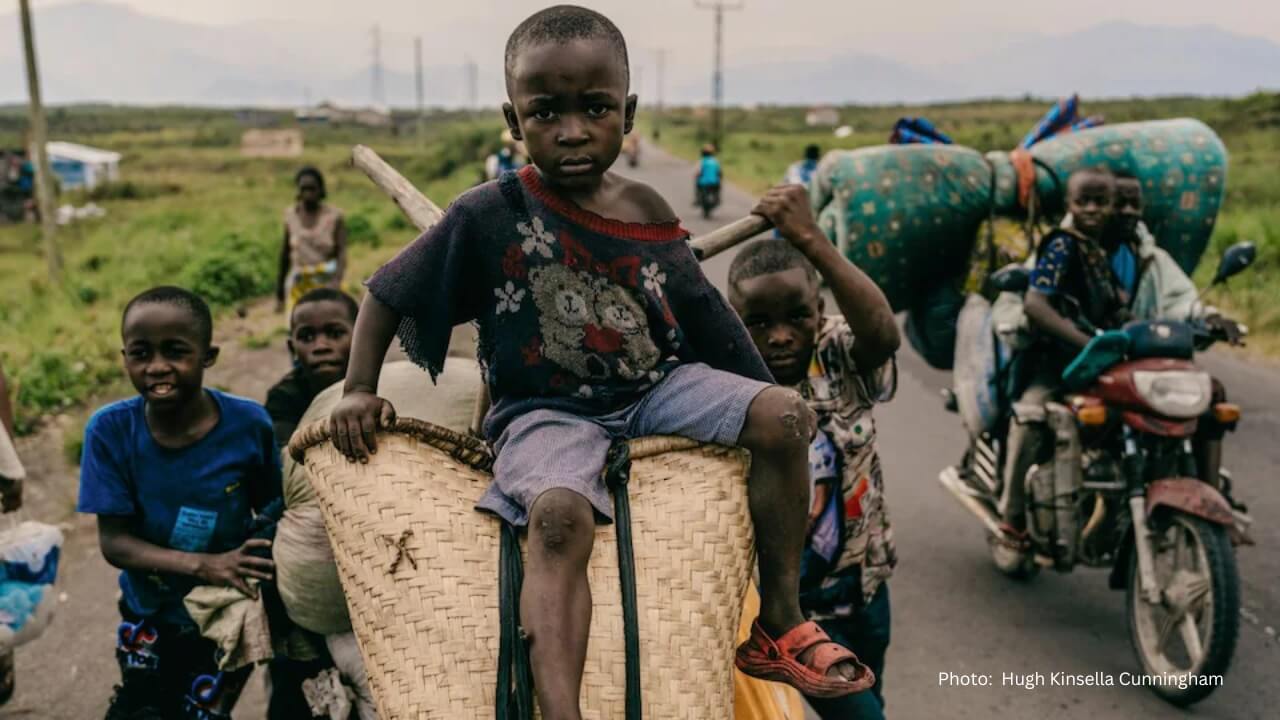The Unheard Sufferings in the Neglected Humanitarian Crisis in Congo
Nuzhat Tabassum | 06 May 2024
How many of us know that a country in Africa has been consumed in a deadly war? The answer would be very few. It has been reported that Africa is not a top priority of Western leaders. To them, wars in Africa are happening to people who live far away, they are different and living in a country that does not hold any significance to world politics or any strategic importance. As everyone is busy with the war in Ukraine and Palestine; the world is forgetting that Africa exists. Ukraine and Palestine have successfully shadowed the war in the Democratic Republic of Congo (DRC) which has been going on for 30 years and has displaced millions of people from their homes. According to the Norwegian Refugee Council’s (NRC) annual analysis, DRC is the world’s most neglected crisis in the world. Congo has been described as “Africa’s First World War,” as countries like Angola, Burundi, Namibia, Rwanda, Uganda, and Zimbabwe have been involved in the war. Over 6 million people have died in this war and 6 million people have been internally displaced since 1996. The UN has called it one of the largest humanitarian crises in the world, people are living in makeshift camps, suffering from hunger, malnutrition, and diseases.
The conflict between DRC and Rwanda goes back to the First Congo War (1996-1997) with the onset of the Rwandan genocide where Hutu extremists killed minority Tutsi people which prompted Hutus to cross the border to take refugees in the eastern part of Congo. A small portion of the Hutu who entered Congo were extremists who started a rebel group Democratic Forces for the Liberation of Rwanda (FDLR) in Congo to take back power in Rwanda and also attacked Tutsis in Congo. After the victory of the Tutsi government in Rwanda; it shifted its focus to DRC and armed Tutsis in Congo with the reason that the Hutus in eastern DRC were a threat to the Tutsis. The then president of Congo Mobutu Sese Seko supported the Hutu extremists while Rwanda and Tutsi militias in Congo supported the opposition leader, Joseph Kabila. Rwanda won the First Congo War and Kabila was installed as the new president of the Congo. However, relations between the two countries worsened soon and in 1998 Second Congo War broke out. Kabila ordered Rwandan and foreign troops to leave Congo due to the unwanted military presence of Rwanda and its influence in Congo. Rwanda, in response, created a new rebel group the Rally for Congolese Democracy (RCD), to overthrow Kabila. Kabila, on the other hand, armed Hutu refugees in the eastern Congo to fight against Rwanda and RCD. As a result, Rwanda invaded Congo but the war ended after peace talks.
In the 2000s, the March 23 Movement, or M23, backed by Rwanda emerged. The M23 refers to a deal, signed on March 23, 2009. M23 has accused Congo of not honoring the deal which was to integrate Congolese Tutsis into the army and administration. The group also wants to defend Tutsi's interests against FDLR. The group took control over Goma, the capital of North Kivu province, in 2013 for 10 days. The UNSC launched the UN Organization Stabilization Mission in the Democratic Republic of the Congo, or MONUSCO to support the Congolese army and was successful in driving M23 away. Recently, the M23 has resurfaced in 2022 and by 2023 has surrounded Goma in the eastern part of Congo. According to M23, the attack was a defense mechanism to protect the Tutsis living in Congo against FDLR which collaborates with the Congolese army. The government of Congo has denied such claims.
In June 2023, MONUSCO decided to pull out from Congo after it failed to prevent the attacks by M23. Since then, violence has increased in the region. Recently, Rwanda or its proxy groups have fired anti-aircraft missiles at a UN drone and has also bombed Goma airport in Congo. Congo as well as the UN has accused Rwanda of funding M23 but Rwanda so far has denied the allegations. Congo is rich in natural resources like cobalt, coltan, copper, ivory, rubber, uranium, tin, tungsten, gold, and diamonds. M23 illegally smuggles these valuable resources and is fighting to take control of the mines. It is speculated that Rwanda wants to force Congo to make a power-sharing agreement to control the resourceful areas. Rwanda is a poor country and depends much on Congo’s resources; meaning, this pro-Rwandan group M23 will never give up on Congo. Congo has become a victim of its own resources.
Though the international community has condemned M23 and Rwanda for their atrocities in North Congo; Congolese people are saying that it is not enough and that the international community should move toward sanctions. The war in Congo is dragging on because of the inattention of world leaders and it is the civilians that are shouldering the burdens. We should come out from the mindset that ‘Africa is not important’ and give importance to the conflicts in Africa that it deserves.
Nuzhat Tabassum, Research Intern, Centre for Governance.
Views in this article are author’s own and do not necessarily reflect CGS policy.
